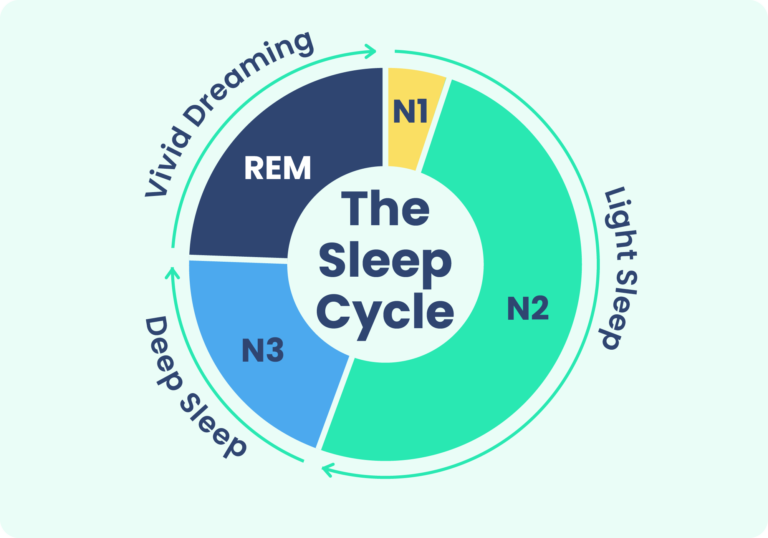Every night we shut our eyes, leaving behind the hustle and bustle of the day, and enter the mysterious world of sleep. It’s no secret that sleep is crucial for our well-being; experts agree that while sleep duration is undoubtedly important, It’s also critical to think about sleep quality. Have you ever wondered what happens during sleep that keeps us feeling refreshed and recharged for the day ahead? Brain recordings reveal that we spend each night alternating between two phases of sleep: rapid eye movement (REM) and non-REM sleep (which has three stages defined by measurements of brain activity) You’ve no doubt heard of REM sleep but what does it mean and why is it important?
Rapid eye movement sleep is one of the four stages we move between throughout the night. This phase earned its name from the rapid and random movements of our eyes that occur while we’re in this sleep stage. When REM sleep was first discovered in the 1950’s, it was thought to be the only sleep phase in which dreams occurred however, research has since shown that REM sleep is involved in a host of other important functions such as memory, healthy brain development, and even emotional processing. Let’s explore the mysteries of REM sleep, why we need it, and what happens when we don’t get enough of this sleep cycle.
Understanding REM sleep
As we sleep, the body cycles through non-REM and REM sleep. The first REM period lasts around ten minutes. As the night goes on, the switch between non-REM and REM sleep continues to occur every 90 minutes or so, but the REM periods get much longer and the non-REM periods become progressively shallower. This cycle is important to help retain your circadian rhythm. If REM sleep is disrupted, the next night your body may fall immediately into REM rather than following the usual sleep cycle.
This can lead to feelings of grogginess, tiredness, and lack of concentration which are the typical side-effects associated with lack of sleep. On average, we spend about one-quarter of every night in REM sleep and go through 3-5 REM cycles per night.

Sleep researchers have concluded that the brain never actually ‘shuts down’ when we go to sleep. Brain cells have no ‘off switch’ and therefore must fire a few times each second just to stay alive and healthy. For this reason, when in REM sleep, much of your body operates similarly to how it does when you’re awake. It’s a stage where our mind comes alive, and we experience vivid dreams. Activity in the brainstem is inhibited, temporarily paralyzing the body which is a protective mechanism to prevent us from acting out our dreams. This phase of sleep is also associated with increased heart rate and irregular breathing.
Why is REM sleep important?
All sleep is important but REM sleep in particular is crucial for our overall well-being and here’s why:
- Memory Consolidation: One of the most critical functions of REM sleep is its role in memory consolidation. During this phase, our brain is busy processing and organizing information from the day. It’s like filing away important memories and discarding irrelevant details. This process helps us learn and remember better. Getting enough REM sleep is therefore important for improving our memory, as well as our creativity, and problem-solving skills.
- Emotional Processing: REM sleep is also closely linked to emotional processing. That’s because the amygdala, the part of your brain that helps you make decisions, form memories, and process emotions activates during this stage of sleep. It’s during this stage that we also dream vividly, sometimes working through unresolved emotions or processing stressors. This contributes to emotional balance and resilience in our waking hours.
- Restoration and Rejuvenation: While REM sleep is more focused on mental aspects, it’s also important for physical restoration. If you’re waking up after a full night of sleep feeling groggy and finding it hard to concentrate during the day, then you might not be getting enough REM sleep. REM sleep helps the body recover, particularly the muscles and the cardiovascular system. This is essential for overall vitality and well-being.
- Brain Development: For infants and children, REM sleep plays an essential role in their cognitive development. It’s during this phase that their brains make crucial connections and neural pathways. Newborns spend about 50% of their sleep time in REM sleep, whereas children and adolescents typically get around 20-25% of their sleep in REM.
REM sleep tends to decrease as we age, but it remains vital for memory and emotional well-being. Even in old age, obtaining sufficient REM sleep is essential for cognitive health. Adults need about 2 hours of REM sleep per night, which accounts for roughly 20-25% of their total sleep time.
What happens when we don't get enough REM sleep?

Sleep deprivation, especially when it comes to REM sleep, can have detrimental effects on our health. studies suggest that being deprived of REM sleep interferes with memory formation. Information becomes harder to retain, and we may struggle to focus and solve problems effectively. A study published in Frontiers found that selective REM sleep deprivation in humans is associated with enhanced emotional reactivity, both at behavioral and neural levels leading to heightened emotional responses, irritability, and mood swings. It becomes challenging to cope with stress and regulate emotions. Common symptoms associated with a lack of REM sleep include fatigue, hypersomnia, and problems with memory and other cognitive tasks during the day.
How to improve REM sleep?
1. Maintain a consistent sleep schedule
Go to bed and wake up at the same time every day, even on weekends. This consistency helps regulate your body’s internal clock and enhances your chances of experiencing adequate REM sleep. By adhering to a sleep schedule, your body will learn when sleep is due and prepare itself accordingly by producing the hormones that aid sleep.
2. Create a Relaxing Bedtime Routine
Engage in relaxing activities before bedtime, such as reading, meditation, or taking a relaxing warm bath. Avoid stimulating activities like watching intense movies or using electronic devices, as they can disrupt REM sleep.
3. Limit Caffeine and Alcohol Intake
Caffeine is a stimulant that can keep you up for hours if you drink it too close to bedtime. Alcohol on the other hand can make you sleepy, but drinking any alcohol in the evening close to bedtime can lead to restlessness and cause you to stay awake at night. It’s best to limit your alcohol and caffeine intake to earlier times in the day. This gives your body enough time to metabolize these substances and break them down long before you go to sleep.
4. Enhance your sleep environment
Sometimes, getting more REM sleep may be as simple as ensuring your bedroom is conducive to quality sleep. This means a dark, quiet, and cool room with a comfortable mattress and pillows. Invest in blackout curtains if needed and try to disconnect or reduce screen time by an hour or more before going to bed. The blue light from a cell phone or tablet may be hindering your sleep by suppressing your natural production of melatonin.
It’s important to remember that individual sleep needs can vary. What’s most critical is to wake up feeling refreshed and alert therefore, if you notice any symptoms of sleep deprivation, it’s advisable to consult with your doctor. They can assist in identifying the underlying causes of your sleep difficulties and develop a treatment strategy to enhance your sleep quality. The importance of a good night’s sleep, particularly REM sleep, should not be underestimated. Despite constituting a minor fraction of the overall sleep cycle, it is essential for maintaining optimal cognitive and emotional functioning.

